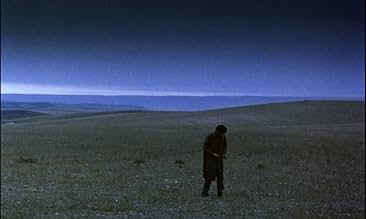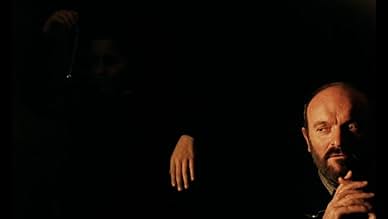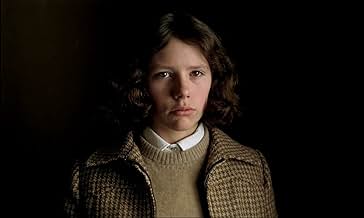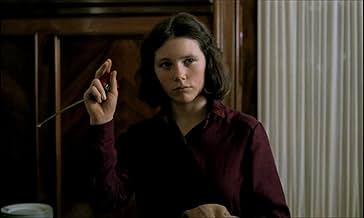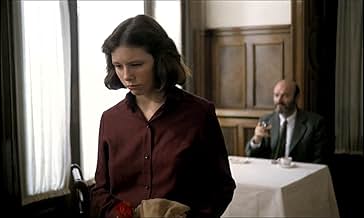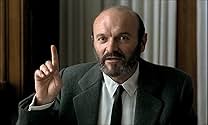VALUTAZIONE IMDb
7,8/10
6874
LA TUA VALUTAZIONE
Una donna riflette sulla sua relazione d'infanzia con suo padre, cercando di capire la profondità della sua disperazione e la verità dei suoi miti.Una donna riflette sulla sua relazione d'infanzia con suo padre, cercando di capire la profondità della sua disperazione e la verità dei suoi miti.Una donna riflette sulla sua relazione d'infanzia con suo padre, cercando di capire la profondità della sua disperazione e la verità dei suoi miti.
- Regia
- Sceneggiatura
- Star
- Premi
- 7 vittorie e 2 candidature totali
Aurore Clément
- Irene Ríos
- (as Aurora Clement)
- …
José Luis Fernández 'Pirri'
- Carioco
- (voce)
- (non citato nei titoli originali)
José García García Morilla
- Chófer
- (non citato nei titoli originali)
Chus Lampreave
- Casilda
- (non citato nei titoli originali)
Jesús Nieto
- Agustín Arenas- voz
- (non citato nei titoli originali)
Recensioni in evidenza
Unless there are impenetrable barriers, most young children love their parents unconditionally, perceiving them as all knowing and all loving. Of course, with growing up often comes a realization that the parents you put on a pedestal are just human beings with flaws, some small, some big. This realization comes reluctantly to Estrella in Victor Erice's poignant 1983 film, El Sur (The South, the beautiful story of the relationship of a daughter and her father, one of only three feature films Erice made in forty years, each one a masterpiece.
Based on the novella of the same name by Adelaida Garcia Morales, the story takes place in the context of post–civil war Spain. Narrated powerfully by fifteen-year-old Estrella, the film is composed of memories and fantasies as she seeks to make sense of the painful events of her childhood. Shot by cinematographer José Luis Alcaine using only natural light, the opening conveys a feeling of an enchanted world. In the first frame, Estrella (Iciar Bollain) awakens in a darkened room with the light focusing only on her. The camera zooms to her hands as she discovers a small box under her pillow containing the pendant her father used as a divining rod.
In her memory, it is the symbol of her father's power that he once used to guess her sex by holding the pendant over her mother's stomach. In the background, we hear a dog barking and Estrella's mother (Lola Cardona) calling for her husband Agustín (Omero Antonutti), but he is nowhere to be found and Estrella knows that he is not coming back. It is only then that the camera moves to her face where a tear is visible. El Sur then flashes back seven years when eight-year-old Estrella, sensitively portrayed by Sonsoles Aranguren, and her parents have moved from the south of Spain and are traveling by train to the north where Agustin has found a job as a doctor in a local hospital.
Estrella's insights into events taking place around her are mature beyond her age. "I grew up more or less like everyone else," she says, getting used to being alone and not thinking too much about happiness." When she is older, her father, whom she idolizes, instructs her in the art of divination and she looks at it as a transfer of a supernatural gift. The slow-developing story reveals the shift in Estrella's perception both of her father and of her country. As she begins to learn more about the war that divided her family and her country, her view of the south as the mythical place depicted in postcards and movies, begins to unravel.
To Estrella, her father's life in the south has always been a mystery and she questions Milagros (Rafaela Aparicio), her father's former governess who is visiting their house, about his life. The governess tells her of the rift her father had with his own father who favored Franco in the Spanish Civil War, and how unhappy his life had been when he was growing up. Estrella's discovery of Agustin's devotion to the starlet Irene Rios (Aurore Clément) whose films played at the local theater is even more unsettling, however, as is the matter of his continuing relationship with a mysterious woman in the south.
The nature of the circumstances that are revealed in the film, however, do not prepare us sufficiently for the events that follow. Forced to curtail production before completion, Erice would have traced Estrella's journey back to the south to uncover the reality of her father's despair, but lack of funding did not permit this and the film, which Erice claims would have become much lighter in tone, was never finished. Although, because of the film's incompleteness, character motivations are murky, El Sur is still a brilliant and haunting work of art. A timeless film of symbol and myth, it was voted the sixth best Spanish film in the 1996 Spanish cinema centenary.
Based on the novella of the same name by Adelaida Garcia Morales, the story takes place in the context of post–civil war Spain. Narrated powerfully by fifteen-year-old Estrella, the film is composed of memories and fantasies as she seeks to make sense of the painful events of her childhood. Shot by cinematographer José Luis Alcaine using only natural light, the opening conveys a feeling of an enchanted world. In the first frame, Estrella (Iciar Bollain) awakens in a darkened room with the light focusing only on her. The camera zooms to her hands as she discovers a small box under her pillow containing the pendant her father used as a divining rod.
In her memory, it is the symbol of her father's power that he once used to guess her sex by holding the pendant over her mother's stomach. In the background, we hear a dog barking and Estrella's mother (Lola Cardona) calling for her husband Agustín (Omero Antonutti), but he is nowhere to be found and Estrella knows that he is not coming back. It is only then that the camera moves to her face where a tear is visible. El Sur then flashes back seven years when eight-year-old Estrella, sensitively portrayed by Sonsoles Aranguren, and her parents have moved from the south of Spain and are traveling by train to the north where Agustin has found a job as a doctor in a local hospital.
Estrella's insights into events taking place around her are mature beyond her age. "I grew up more or less like everyone else," she says, getting used to being alone and not thinking too much about happiness." When she is older, her father, whom she idolizes, instructs her in the art of divination and she looks at it as a transfer of a supernatural gift. The slow-developing story reveals the shift in Estrella's perception both of her father and of her country. As she begins to learn more about the war that divided her family and her country, her view of the south as the mythical place depicted in postcards and movies, begins to unravel.
To Estrella, her father's life in the south has always been a mystery and she questions Milagros (Rafaela Aparicio), her father's former governess who is visiting their house, about his life. The governess tells her of the rift her father had with his own father who favored Franco in the Spanish Civil War, and how unhappy his life had been when he was growing up. Estrella's discovery of Agustin's devotion to the starlet Irene Rios (Aurore Clément) whose films played at the local theater is even more unsettling, however, as is the matter of his continuing relationship with a mysterious woman in the south.
The nature of the circumstances that are revealed in the film, however, do not prepare us sufficiently for the events that follow. Forced to curtail production before completion, Erice would have traced Estrella's journey back to the south to uncover the reality of her father's despair, but lack of funding did not permit this and the film, which Erice claims would have become much lighter in tone, was never finished. Although, because of the film's incompleteness, character motivations are murky, El Sur is still a brilliant and haunting work of art. A timeless film of symbol and myth, it was voted the sixth best Spanish film in the 1996 Spanish cinema centenary.
10jsorribe
After "The Spirit of the Beehive" Erice retakes post-civil war Spain through the eyes of a child (and later a teenager in this case). Not only the director recreates admirably the atmosphere of those gloomy years in my country, but also succeeds in showing the relationship between a bitter, low-spirited father and his vital daughter. Wonderful cinematography and sets also contribute to create a masterwork in which every camera move, every dialogue line and every fade constitute a brilliant piece of its own. An absolute must for all cinema lovers.
This story unfolds in delicate time in the history of modern Spain, as well as during a precarious time in the life of a family.
Adolescent Estrella lives in awe of her mysterious and magical father, wonderfully played by Omero Antonutti, and weary of her ever-practical mother and of their isolated life in the misty and brooding northern countryside. Estrella's fascination with her father turns to intrigue- and then to obsession- when she discovers that her father has a secret, and realizes that she is only one facet of her father's life and not the central figure, as he is to her.
After a ray of sunshine is cast into her dark and insular life by the visit of one of her father's aunts (played by the late Rafaela Aparicio in one of her best roles), Estrella yearns to capture more of the essence of her father by one day visiting "el sur" (the south)his home territory.
As Estrella enters the awkward realm of adolescence, she grows apart from her father emotionally. A tragic turn of events condemns him to remain a mythical figure for hersomeone she wonders if she ever knew at all. The supreme irony is that she is very like him.
This film is captivating, both visually and emotionally, and the audience becomes just as absorbed in the story as the characters themselves. It is one of those films whose imagery will always stay in one's memory, such as in the my favorite scene, where father and daughter sit distantly across a table from each other in an old café, listening to the eerie sound of a "pasodoble" that wafts from a wedding in another room, bringing memories of happier, simpler days.
Adolescent Estrella lives in awe of her mysterious and magical father, wonderfully played by Omero Antonutti, and weary of her ever-practical mother and of their isolated life in the misty and brooding northern countryside. Estrella's fascination with her father turns to intrigue- and then to obsession- when she discovers that her father has a secret, and realizes that she is only one facet of her father's life and not the central figure, as he is to her.
After a ray of sunshine is cast into her dark and insular life by the visit of one of her father's aunts (played by the late Rafaela Aparicio in one of her best roles), Estrella yearns to capture more of the essence of her father by one day visiting "el sur" (the south)his home territory.
As Estrella enters the awkward realm of adolescence, she grows apart from her father emotionally. A tragic turn of events condemns him to remain a mythical figure for hersomeone she wonders if she ever knew at all. The supreme irony is that she is very like him.
This film is captivating, both visually and emotionally, and the audience becomes just as absorbed in the story as the characters themselves. It is one of those films whose imagery will always stay in one's memory, such as in the my favorite scene, where father and daughter sit distantly across a table from each other in an old café, listening to the eerie sound of a "pasodoble" that wafts from a wedding in another room, bringing memories of happier, simpler days.
His first film was a lucid, enigmatic and fascinating film entitled "The Spirit of the Beehive", about a young girl in post-Civil War Spain who becomes obsessed with finding the spirit of Frankenstein's monster. His second film, "The South", is nominally about the same things, the delicate and subsequently shattered innocence of childhood, the power of the cinema, and in a more direct yet completely oblique way, the effects that the Spainish Civil War had on that country, as 'the south' becomes to our protagonist this mythic enigma of a place functioning as both heaven and hell, mostly filled in by her father's former nanny's descriptions of the complex situation the war had, and the tossed-off manner in which the stories of the father and his father are delivered are engrossingly enigmatic, theoretically to keep from exposing a closed wound to the young child, but are given in such a vivid shorthand that all the buried truths are there to discover for any discerning viewers older than the protagonist.
The film chronicles a young girl named Estrella who is living in northern Spain who considers her father almost a deity, he is interesting, pleasant and in her eyes, possibly magic, as his enchantment towards mysticism seems to carry on to his daughter. But one day, she discovers a letter by her father where all that is written is a woman's name, over and over, and one night, he disappears for a time, and returns just as suddenly. As she grows older, she decides to follow him on a trip to a local theater, where she discovers the woman's name from the letter on a poster for the film currently playing. After the film, she tracks him down to a local café, where he is composing a letter to the female star of the film, a former lover who he would like to get reacquainted with. He receives a letter back, and soon afterwards, becomes curt, practically silent and emotionally distant, to the point that he seems cut off to the world.
The film's themes towards childhood innocence and lost loves are universal even as they appear bizarrely unique, and although there are a lot of odd details that are left hanging (her prospective admirer, who is a compulsive graffiti artist), they seem to enrich the specifics of this particular situation even as they enhance the general associative qualities of the story around them. The acting, from the Estrellas of both ages (Sonsoles Aranguren at 8, Iciar Bollain at 15) is pitch-perfect, and Omero Antonutti is impeccable, displaying an ability to put forth a wide range of emotions in a very select amount of movements and expressions, and whether he's lovingly essaying a letter to a past lover, or shutting the world out once his reply comes back, you may not always understand his motivations, but you get the sentiment, and you know exactly what he's going for, much in the way that a frowny face means 'sad', except that Antonutti has a range of about three inches on his face with which he brings forth this myriad of emotions.
The film's visuals have a wondrous, hypnotic lyricism to them, from the look to the style to the movement of the camera, something more impressive considering that the film is not all that stylistically obvious, there's nothing that makes you go, "Wow!", but it's there, and you feel it deep down in your soul. It's been too long since I've seen "The Spirit of the Beehive", but I seem to remember this quality being present there as well, and I liken it to the effect of "The Exorcist". There's nothing to make you SCREAM in the exorcist, they're no jump scares, no It Was Just a Cat moments, but the film has such a potent sense of overwhelming DREAD that it just crawls inside your skin and festers, to a glorious extent.
Now, this is not to say the film is without fault. The father's transition from "good dad who has a hang-up about an old relationship" to "full-on shut-in who hates everyone and never speaks to his family again" seemingly takes place within a matter of minutes (and that's FILM LIFE minutes, not just minutes of the movie), and the particulars of his former lover and their relationship are left frustratingly scant, and this doesn't seem like a situation where the act is all that matters, this could have been fleshed out to a more effect breadth, and although I do mostly understand the meaning of the finale, it doesn't make it any less jarringly sudden or unsatisfying. The fact that the film apparently ends only two-thirds of the way into the novel seems to support this conclusion. Also, almost all of the film is presented from the daughter's point of view, but there's several important chunks depicted from the father's perspective that, although informative from an expositional standpoint, seem to sort of reduce the delicate mystery and the effect it would have created had we stayed wholly with the girl.
The film is nowhere near as moving as the minor keys of "Beehive" were, but the film is captivating, engaging and never overstays its welcome (at a svelte 95 minutes), and is most definitely a worthwhile filmgoing experience that is worth hunting down and worth praying for the Criterion treatment for. Thanks, Vic, I can't wait to track down the other 33.3% of your filmography, because so far, you're 2-for-2.
{Grade: 8.25/10 (high B) / #13 of 1983}
The film chronicles a young girl named Estrella who is living in northern Spain who considers her father almost a deity, he is interesting, pleasant and in her eyes, possibly magic, as his enchantment towards mysticism seems to carry on to his daughter. But one day, she discovers a letter by her father where all that is written is a woman's name, over and over, and one night, he disappears for a time, and returns just as suddenly. As she grows older, she decides to follow him on a trip to a local theater, where she discovers the woman's name from the letter on a poster for the film currently playing. After the film, she tracks him down to a local café, where he is composing a letter to the female star of the film, a former lover who he would like to get reacquainted with. He receives a letter back, and soon afterwards, becomes curt, practically silent and emotionally distant, to the point that he seems cut off to the world.
The film's themes towards childhood innocence and lost loves are universal even as they appear bizarrely unique, and although there are a lot of odd details that are left hanging (her prospective admirer, who is a compulsive graffiti artist), they seem to enrich the specifics of this particular situation even as they enhance the general associative qualities of the story around them. The acting, from the Estrellas of both ages (Sonsoles Aranguren at 8, Iciar Bollain at 15) is pitch-perfect, and Omero Antonutti is impeccable, displaying an ability to put forth a wide range of emotions in a very select amount of movements and expressions, and whether he's lovingly essaying a letter to a past lover, or shutting the world out once his reply comes back, you may not always understand his motivations, but you get the sentiment, and you know exactly what he's going for, much in the way that a frowny face means 'sad', except that Antonutti has a range of about three inches on his face with which he brings forth this myriad of emotions.
The film's visuals have a wondrous, hypnotic lyricism to them, from the look to the style to the movement of the camera, something more impressive considering that the film is not all that stylistically obvious, there's nothing that makes you go, "Wow!", but it's there, and you feel it deep down in your soul. It's been too long since I've seen "The Spirit of the Beehive", but I seem to remember this quality being present there as well, and I liken it to the effect of "The Exorcist". There's nothing to make you SCREAM in the exorcist, they're no jump scares, no It Was Just a Cat moments, but the film has such a potent sense of overwhelming DREAD that it just crawls inside your skin and festers, to a glorious extent.
Now, this is not to say the film is without fault. The father's transition from "good dad who has a hang-up about an old relationship" to "full-on shut-in who hates everyone and never speaks to his family again" seemingly takes place within a matter of minutes (and that's FILM LIFE minutes, not just minutes of the movie), and the particulars of his former lover and their relationship are left frustratingly scant, and this doesn't seem like a situation where the act is all that matters, this could have been fleshed out to a more effect breadth, and although I do mostly understand the meaning of the finale, it doesn't make it any less jarringly sudden or unsatisfying. The fact that the film apparently ends only two-thirds of the way into the novel seems to support this conclusion. Also, almost all of the film is presented from the daughter's point of view, but there's several important chunks depicted from the father's perspective that, although informative from an expositional standpoint, seem to sort of reduce the delicate mystery and the effect it would have created had we stayed wholly with the girl.
The film is nowhere near as moving as the minor keys of "Beehive" were, but the film is captivating, engaging and never overstays its welcome (at a svelte 95 minutes), and is most definitely a worthwhile filmgoing experience that is worth hunting down and worth praying for the Criterion treatment for. Thanks, Vic, I can't wait to track down the other 33.3% of your filmography, because so far, you're 2-for-2.
{Grade: 8.25/10 (high B) / #13 of 1983}
10ay9a
It must be almost twenty years since I saw this movie (and I saw it only once, when I was in Japan), but the memory of this movie remains in me like an old haunting dream from childhood. Cinematography at its best. I think, for the first time, this film made me think that the best media for poetry is not words, but vision.
I would want to recommend this to anyone who loves "Spirit of the Beehive" and thinks it cannot be surpassed. But alas, I don't know how you get this movie in USA with English subtitle.
I would want to recommend this to anyone who loves "Spirit of the Beehive" and thinks it cannot be surpassed. But alas, I don't know how you get this movie in USA with English subtitle.
Lo sapevi?
- QuizDirector Víctor Erice considers this to be an unfinished project. The original script consisted of more than 400 pages and was scheduled to be shot in 81 days. 48 days into shooting, when production was to be moved to the south of Spain, producer Elías Querejeta unexpectedly suspended the project, allegedly because of financing objections by Televisión Española, the backing television network. However, Querejeta revealed years later that he made the decision because he thought the film was complete with what they'd shot so far.
- ConnessioniFeatured in Huellas de un espíritu (1998)
- Colonne sonoreLa puerta del Sagrario
Composed by Enrique Granados
I più visti
Accedi per valutare e creare un elenco di titoli salvati per ottenere consigli personalizzati
- How long is El Sur?Powered by Alexa
Dettagli
- Data di uscita
- Paesi di origine
- Sito ufficiale
- Lingua
- Celebre anche come
- El Sur
- Luoghi delle riprese
- Aziende produttrici
- Vedi altri crediti dell’azienda su IMDbPro
Botteghino
- Lordo in tutto il mondo
- 22.720 USD
Contribuisci a questa pagina
Suggerisci una modifica o aggiungi i contenuti mancanti


